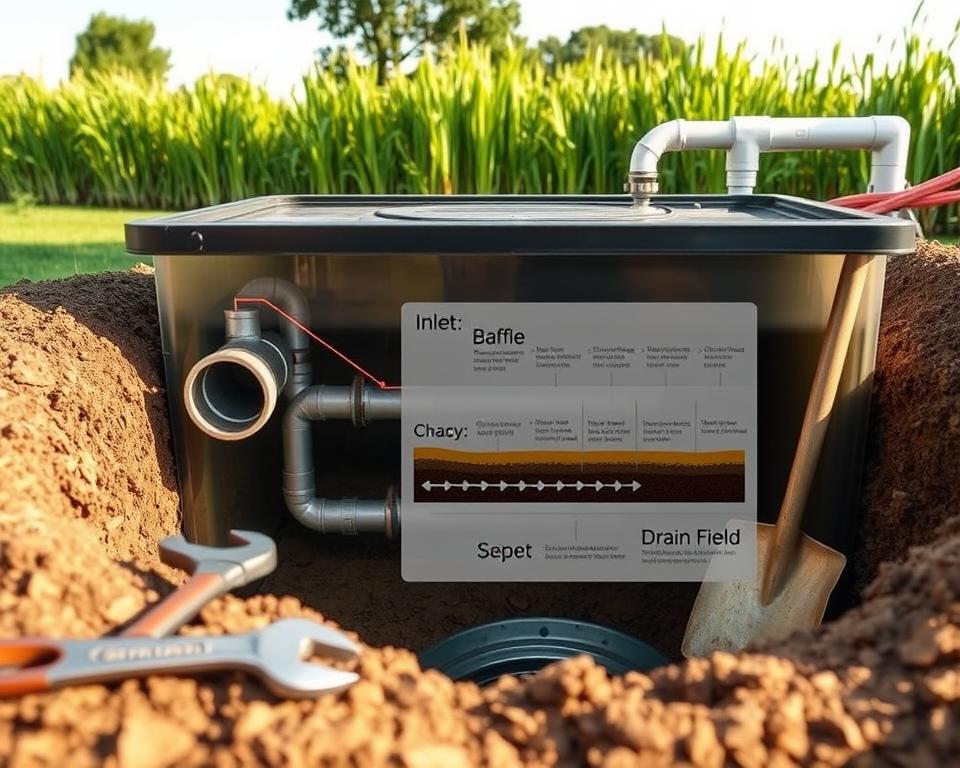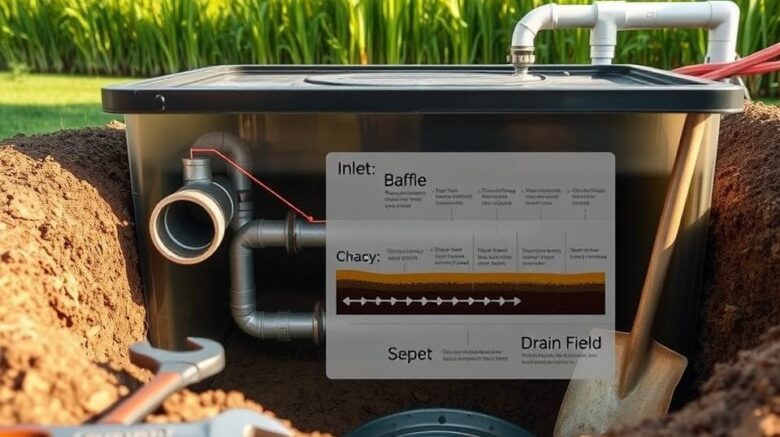Septic System Pumping
Do you ever think about how often you should set up septic system pumping so you can dodge expensive malfunctions? With over 20 percent of U.S. households relying on septic systems, grasping their maintenance is essential. Having a clear idea of when to plan a septic tank service is paramount to its durability. Moreover, homeowners have access to budget-friendly septic pumping solutions that ensure excellent functionality without overspending. Below, we outline essential upkeep tips beneficial for every homeowner.
Significant Points
- Scheduled septic system pumping is essential for smooth performance.
- Recognizing the signs that show the requirement for service can head off major issues.
- Hiring licensed septic system pumpers secures quality maintenance.
- Affordable septic pumping choices are accessible for homeowners.
- Regular inspections promote peak system performance.
Learning About Your Septic System
A septic system performs a vital role in managing household wastewater, comprising several integral components that operate in unison. The primary drain line channels wastewater from your home to the septic tank, where the process begins. In the tank, an underground chamber, solids accumulate at the bottom, and bacteria digest these solids, treating the waste thoroughly.
The clarified liquid outflow then flows from the septic tank to the distribution box, where it is spread evenly across the drain field or leach field. Here, the soil continues the filtration, further purify the wastewater. Understanding the functions of these septic system parts is vital. It allows homeowners to oversee and upkeep their systems properly.
Understanding how your septic system runs lets you adopt proactive maintenance measures. It’s beneficial to have scheduled appointments with qualified cleaners of septic systems – septic inspection. They offer crucial insights for optimal operation of your system. These experts aid in arranging the essential pump-outs and checks. This proactive approach can greatly lengthen your septic system’s lifespan.
Importance of Septic System Maintenance
Maintaining your septic tank consistently is key for homeowners who wish their system to last. A well-cared-for system provides peace of mind and safeguards your property’s value. Without adequate care, you’re risking system breakdowns and health dangers.
Opting for a top-notch septic pumping service is essential. They offer timely inspections and pump-outs, extracting sludge and scum buildup. If maintenance is ignored, last-minute pumping may be required, which is costly.
Following a steady maintenance plan is prudent. It entails professional evaluations and regular pumping. This preventive measure helps avoid urgent issues, ensuring a more secure living environment for everyone.

Warning Signs for Septic Systems
Staying mindful of septic system issues can prevent costly repairs and major damage. Key signs show when your system needs a check. These include:
- Delayed drains throughout the house
- Pooling water in the yard above the drain field
- Bad odors near the septic tank or leach field
- Exceptionally green grass growth in specific areas of your yard
These symptoms could indicate problems that might cause your system failing. Prompt action is essential. Contacting septic pumping professionals for an inspection aids. Timely action prevents minor issues from growing into major ones. Plus, consistent upkeep guarantees your system works well and lasts longer.
Septic System Pumping: Best Practices
Correct pumping of your septic tank is imperative to avoid expensive clogs and backups. It’s vital to find the ideal interval for maintenance. Homeowners should usually schedule pumping every 2 to 5 years, based on the tank’s size and household wastewater levels. Frequent use of garbage disposals may require more frequent pumping.
Employing experienced pumpers guarantees your tank gets a thorough clean and check-up. During pumping, specialists look for any issues, such as faulty baffles. Finding these problems early avoids costlier expenses and inconveniences later. Scheduled pumping schedules and expert help ensure your septic system’s efficient operation.
Routine Inspections for Optimal Performance
Routine inspections are vital for your septic system’s effectiveness. Septic system inspections reveal small issues before they worsen. Experts advise inspections every three to five years, depending on system size and household usage. This prevents costly fixes.
Keeping maintenance records is crucial for monitoring your system’s condition. These records offer insights into previous inspections, repairs, and when to schedule septic tank cleaning services. With this information, organizing for future upkeep becomes easier, maintaining septic systems in prime shape.
Regular inspections and detailed record-keeping not only improve system efficiency but also lengthen its life. This approach protects the environment and the investment in a safe, operational home.
| Inspection Type | Recommendation Frequency | Benefits |
|---|---|---|
| Visual Inspection | Annually | Identify surface issues |
| Professional Inspection | Every 3–5 years | Assess functionality and detect problems |
| Septic Tank Pumping | Every 3–6 years | Prevent overflow and system failure |
Efficient Water Usage to Extend Septic Life
Mindful water use is crucial for keeping your septic system healthy. It not only helps the environment but also boosts the performance of your home’s plumbing. By embracing easy, yet effective, conservation methods, homeowners can reduce wastewater.
Spread out your laundry activities over the week instead of completing them in a single day. This enables the septic system to handle water better and prevents tank overflow. Choosing low-flow fixtures in your kitchens and bathrooms leads to considerable water savings, retaining the water pressure up while reducing the flow rate, thus lowering the amount of wastewater produced each day.
Quickly fixing leaks is another way to support your septic system. Even a small leak can lead to a large waste of water, stressing the septic system. Through regular inspections and repairs, you contribute significantly to the system’s efficiency.
Focusing on water conservation isn’t just advantageous for your septic system; it’s also a step towards environmentally responsible living. Embedding such practices a part of your lifestyle helps both your household and the planet.
Managing Household Waste Correctly
Homeowners carry a key role in preserving their septic system’s health by disposing of household waste appropriately. It’s important to avoid disposing of non-biodegradable items like wipes, plastics, and other harmful products in the system. These items can cause clogs, resulting in expensive repairs and a reduction in efficiency.
Recycling food scraps and organic materials is a helpful alternative to disposing of them conventionally. This practice significantly cuts down on the amount of solid waste entering the septic tank. Emphasizing biodegradable waste disposal preserves the ecological balance needed for effective waste management.
It’s essential to monitor what goes down the drains. Non-decomposable items can necessitate more frequent septic tank pumping. By grasping and adhering to correct waste disposal methods, you can secure a more efficient and long-lasting septic system.
Cleaning Product Tips for Septic Health
The health of your septic system largely hinges on your choice of cleaning products. Selecting septic-safe cleaning products is crucial. These products safeguard the balance of beneficial bacteria that break down waste. Many standard cleaners have harmful chemicals that threaten this balance, causing pricey repairs or system failure.
Homeowners should try natural alternatives that are both effective and environmentally friendly. Common household items like baking soda, vinegar, and lemon juice are great choices. These natural cleaners are not only effective but also support your septic system’s health.
Avoiding products that contain antibacterial agents and chlorine bleach is important. Such substances destroy the beneficial good bacteria, undermining your system’s functionality. By choosing sustainable products, you secure both the efficiency and longevity of your septic system.
Why Bacteria Matter in Septic Systems
Bacteria carry out a key role in keeping your septic system efficient. They decompose solids organically and boost nutrient processing. A lack of healthy bacteria can lead to system failure, bringing about expensive repairs.
Homeowners can improve their system by using organic additives. These products increase beneficial bacteria, making waste decomposition faster. It’s important to choose organic additives that are advantageous, not harmful, to the septic environment.
A healthy bacterial community is key to a septic system’s longevity and efficiency. It prevents solid buildup and lessens the need for repeated pumping. Prioritizing bacterial health creates waste management more effective and eco-friendly.
In Closing
Septic system care is vital for the life and functionality of your home’s wastewater system. Adhering to critical maintenance tips prevents expensive repairs. Grasping routine pumping and inspections is fundamental. This secures your septic system keeps in excellent condition.
Becoming knowledgeable of your septic system’s operation and smart approaches in water and waste management is important. Engaging professionals like All in Sanitation delivers expertise. This supports your septic system’s long-term health and gives peace of mind.
Investing in proper septic maintenance today brings future benefits. It shields your home and boosts your family’s quality of life. Prioritizing septic system care delivers confidence with a well-maintained system.
